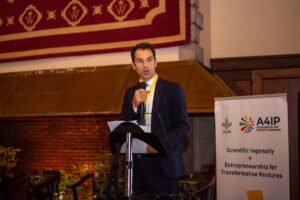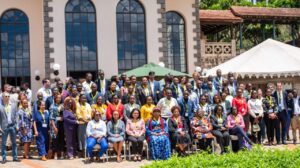
The AgriTech4Kenya Consultation workshop took place at Windsor Hotel Kiambu to discuss on The Transformative Impact of Research and Innovation in Agri Tech.
The AgriTech4Kenya Consultation Workshop & Launch set the stage for a pivotal dialogue among key stakeholders, including government officials, academicians, researchers, incubators, accelerators, venture funds, startups, and farmers, to explore and enhance the agrifood and climate-tech innovation landscape in Kenya.
Kenya consistently imports more than USD 1.1 billion worth of food each year. In 2022 alone, food imports rose from 13.4 percent to 15.5 percent.
This marks a notable paradox given the country’s abundant fertile land. The heavy reliance on imports, coupled with the ever-growing challenges of climate change, poses significant obstacles to Kenya’s food security and economic and agricultural development. Water scarcity is a particularly critical impediment to Kenyan agriculture, with prolonged dry seasons severely minimizing yields and subsequently affecting both livelihoods and food security
Additionally, the dominance of traditional agricultural practices grapples with resource constraints and yield inconsistencies and exacerbate productivity shortfalls With 15 research centers globally, a network of over 9,000 scientists, researchers, technicians and staff, and Impact Areas in ‘Nutrition, Health and Food Security’ and ‘Climate Adaptation and Mitigation’, CGIAR is strategically positioned to address Kenya’s critical challenges.
The Government of Kenya’s initiatives – including the Big 4 Agendaiv and the Science, Technology, and Innovation Policyv
within the Vision 2030, underscore the imperative for research-driven innovation to bolster food security and climate
resilience. The transition towards sustainable agricultural practices necessitates the harmonious integration of sciencebased innovations, equitable finance, improved market access, and capacity building within the agritech ecosystem.
This multifaceted approach, supported by research institutions and agri-food technology acceleration programs, is essential for empowering entrepreneurs and transforming Kenya’s agricultural landscape into a robust pillar of food security, rural development, and economic growth. Investing in agritech innovations not only holds the potential to revolutionize agriculture in Africa but also contributes to the achievement of the 2030 Sustainable Development Goals.

Through success stories from organizations like UjuziKilimo, and Farmshield, it is evident that agritech innovations are driving positive change, enhancing agricultural productivity, resilience, and sustainability across the continent.
The global downturn in agri-food technology investment in 2023, however, highlights the urgent need for targeted support and investment to revitalize the sector. A collaborative effort from the government, private sector, civil society,
and farmers is needed to transform Kenya’s agricultural sector into a powerful engine of innovation for food security, rural development and economic prosperity. CGIAR’s 2030 Research and Innovation Strategy prioritizes innovation
and scalability as key components of its mission and emphasizes the significance of innovative public and private
partnerships in bolstering cutting-edge solutions, thus optimizing its current participation in thousands of innovation
and scaling projects.
In this context, the AgriTech4Kenya Innovation Challenge 2024 has been designed to catalyze agrifood systems
transformation in Kenya by supporting the development, deployment, adoption, and scalability of high-impact, countryrelevant science-based agritech solutions.
There will be 25 slots up for grabs, with 20 allocated for early-stage startups and 5 for CGIAR-led innovations. The selected innovations will undergo a bootcamp, culminating in a pitching session during the CGIAR science week. Out of these, 10 will be early-stage startups, and 2 will be CGIAR-led. These innovations will then enter an acceleration program, with the top 3 winners receiving post-acceleration support. CGIAR will provide technical assistance as part of the post-acceleration support.